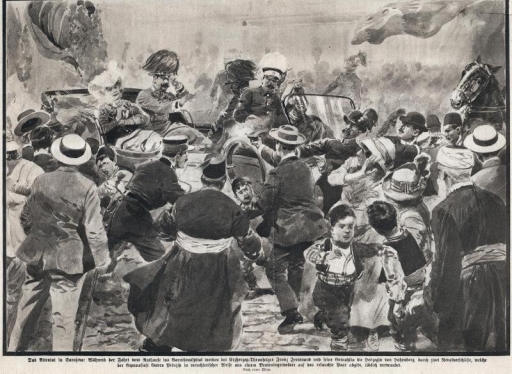The Austrian press has been critical of the presentation of a document by the National Archive of Serbia, which Serbia claims absolves it of any “guilt” in starting the First World War.
The Director of the National Archive of Serbia, Dr. Miroslav Perisic, unveiled a copy of a document from 1913, which he claims absolves Serbia of any “guilt” for the outbreak of the First World War and highlights Austria-Hungary’s preparedness for war with Serbia.
The claim has been criticised by many local and national news outlets in Austria and the German-language press.
The letter, dated the 28th May 1913, is from the Austrian Governor of Bosnia and Herzegovina, Oskar Potiorek, to the Austro-Hungarian Minister of Finance. It highlights the importance of preventing a “union of all Southern Slavs” and that the Austro-Hungarian Empire should prepare for “an inevitable large-scale war in a few years”.
The Director of the National Archive of Serbia stated that the letter – of which the original cannot be located – is “a primary source and one of the most important historical sources for the study of questions of guilt and responsibility for the First World War”.
He stated that the assassination of Archduke Franz Ferdinand by Bosnian-Serb nationalist Gavrilo Princip had been “misused” and was “a smokescreen for the persecution of the Serbian people” at the outbreak of the First World War.
The document presented by the National Archive of Serbia is a 1930 typewriter copy of the handwritten letter.
Serbian press
The Austrian press was critical of the apparent jubilation with which the presentation of the document was greeted in the Serbian press.
On the 5th January 2014, Blic ran the headline ‘Vienna panned war in 1913’; Novosti went with the headline that Austria had ‘planned war a year before the murder of Ferdinand’; whilst an online article on the Kurir website stated that ‘Austria-Hungary was preparing for war 13 months before murder of Ferdinand!’.
German international Die Welt commented that the headline: ‘We are not to blame for the war. Potiorek planned the attack on Serbia one year before the assassination’ was “beamed” by Serbia’s Telegraph.
Novosti headline: Austria had ‘planned war a year before the murder of Ferdinand’
Kurir’s headline that ‘Austria-Hungary was preparing for war 13 months before murder of Ferdinand!’
“Al-Qaeda like terrorist”
The Austrian press was dismissive of the claims made by Serbia, with many news outlets stating that the letter had been “incorrectly” translated.
The newspaper Neue Zürcher Zeitung published an article on its website on the 7th January 2014 about the letter, in which it stated that Serbia refused to accept that Gavrilo Princip would be remembered as an “Al-Qaeda like terrorist”.
It also claimed that Belgrade refused to accept that Serbia was “complicit in the catastrophe of the First World War”.
The article also states that a huge “propagandistic effort” had been put in to the presentation of the letter by the Serbian authorities, with the intention of trying to “whitewash Serbia of all charges [of its role in the outbreak of the First World War]”.
Neue Zürcher Zeitung also claimed that the full, original German-language document had not been made available, even after requests were made by journalists, and that only a “greatly reduced” Serbian translation had been presented.
Neue Zürcher Zeitung headline: ‘”…The State Archives presents “one of the most important sources for the study of the question of guilt”. But the document is incorrectly translated’.
“No big deal”
Die Press ran an article in which it stated the letter was not the “sensation” Dr. Perisic had hoped it would be and that the document provided “nothing new” about the origins of the First World War.
Die Press also stated that the “study of causes of the First World War on the side of the Serbs sometimes takes on strange forms” and highlighted that “the Serbian translation does not seem to match the German original”.
The German international Die Welt quoted prominent Austrian historian Manfried Rauchensteiner who said the letter was “no big deal”.
Die Welt aslo queried why Mr. Rauchensteiner’s question as to how the document ended up in Belgrade could not be answered by Dr. Perisic.
As the controversy surrounding the presentation of the 1913 letter continues, Centenary News will report as the story develops.
Posted by: Daniel Barry, Centenary News
